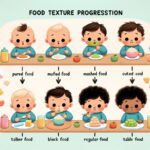Introducing the best solid foods to introduce to 8-months-old can be an exciting yet challenging journey for many parents. This pivotal stage in your baby’s growth requires a combination of nutritious foods that meet their developmental needs while being safe and enjoyable. Knowing the right foods to introduce can play a crucial role in their overall health and development.
Understanding Your Baby’s Nutritional Needs at 8 Months
At 8 months old, your baby’s diet starts to undergo significant changes. Besides breast milk or formula, which should still be the primary source of nutrition, your baby is now ready to explore a variety of tastes and textures. It’s important to introduce solid foods that are rich in iron, zinc, and vitamins A and C, which are crucial for your baby’s growth and development. According to the CDC, iron-fortified cereals are a good start, but there’s a wide range of solid foods that can meet these nutritional needs.
Ensuring that your baby gets a diverse diet can help prevent the development of food allergies. For babies with a family history of allergies, introducing allergenic foods like peanuts and eggs in a controlled manner from 6 months onwards can be beneficial. This approach should always be discussed with a healthcare provider to ensure it’s suitable for your baby.
Best Solid Foods to Introduce to 8-Months-Old
When considering the best solid foods to introduce to 8-months-old, focus on foods that are easy to digest, nutrient-rich, and have a soft texture. Here are some top recommendations:
1. Soft fruits: Bananas, peaches, pears, and avocados are excellent because they can be easily mashed and are rich in vitamins. 2. Cooked vegetables: Sweet potatoes, carrots, and squash can be steamed and mashed. They’re high in beta-carotene and other essential nutrients. 3. Iron-fortified cereals: Start with single-grain cereals like oatmeal or barley, which are easy on the stomach. 4. Protein-rich foods: Soft-cooked beans, lentils, and small pieces of meat or tofu can help meet your baby’s protein needs. 5. Dairy: Small amounts of yogurt or cottage cheese can be introduced, provided there’s no family history of dairy allergies.
Remember, each baby is unique, and what works for one may not work for another. Always introduce one food at a time and watch for any signs of allergies.
Introducing Textures and Flavors
Introducing a variety of textures and flavors is crucial at this stage. It can help prevent picky eating habits in the future and encourage a love for healthy foods. Begin with smooth, pureed foods, and gradually move towards more textured varieties as your baby shows readiness.
Incorporating a mix of flavors and textures can make meal times exciting for your baby. For instance, mixing a mild vegetable like pumpkin with a stronger-tasting one like spinach can introduce your baby to a range of flavors. Similarly, alternating between sweet and savory foods can help them develop a balanced palate.
For parents looking for guidance on introducing solid foods and managing potential food allergies, resources like Identifying and Managing Food Allergies in 8-Month-Olds can be incredibly helpful.
Remember, the journey to solid foods is not just about nutrition; it’s also about exploring and enjoying food. By choosing the best solid foods to introduce to 8-months-old, you’re not only nourishing their bodies but also cultivating a healthy relationship with food that can last a lifetime.
For additional tips and guidance on your baby’s nutritional journey, consider exploring resources on Nutritional Needs for Babies Born Prematurely at 8 Months and Best Solid Foods to Introduce to 8-Months-Old, which offer targeted advice and insights for babies at this crucial stage of development.













